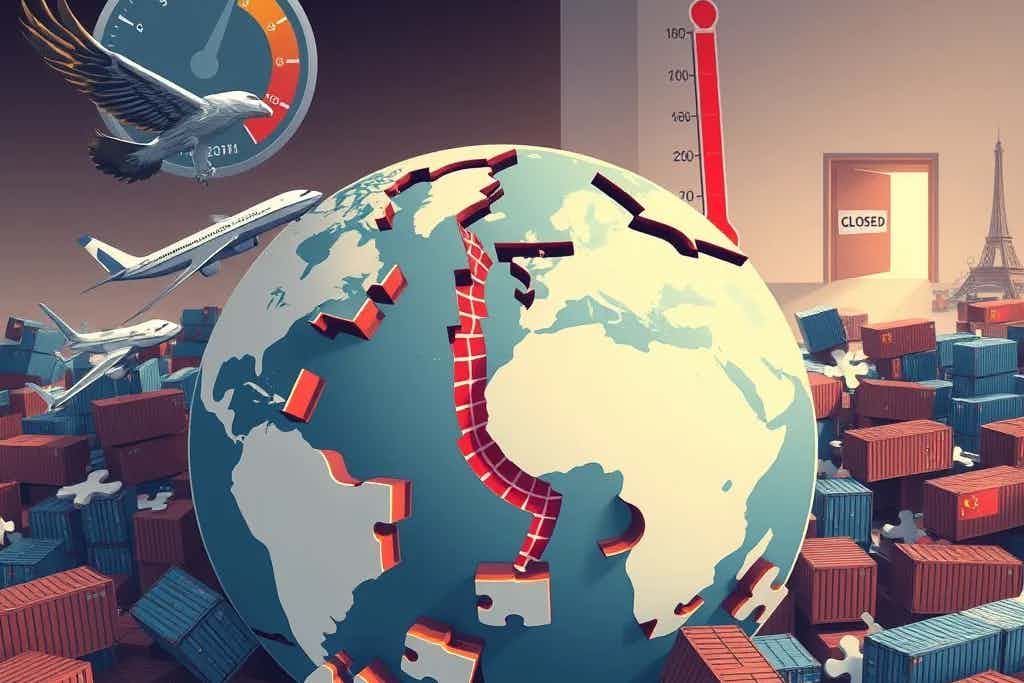In an increasingly interconnected world, geopolitical tensions have far-reaching consequences that extend beyond political borders. One of the most significant areas affected by these tensions is the global supply chain, which in turn has a profound impact on inflation rates worldwide. This article explores the complex relationship between geopolitical events, supply chain disruptions, and inflationary pressures.
The Interconnected Nature of Global Supply Chains
Modern supply chains are intricate networks spanning multiple countries and continents. This interconnectedness has brought about numerous benefits, including:
- Cost efficiencies
- Access to specialized labor and resources
- Diversification of supply sources
However, this global integration also means that disruptions in one part of the world can have cascading effects across the entire system.
Geopolitical Tensions: A Major Disruptor
Several geopolitical factors can severely impact global supply chains:
- Trade Wars: Tariffs and trade restrictions can increase costs and limit access to crucial components or raw materials.
- Regional Conflicts: Wars or civil unrest can disrupt production and transportation in affected areas.
- Sanctions: Economic sanctions can cut off entire countries from global trade networks.
- Diplomatic Disputes: Even non-violent disagreements between nations can lead to trade restrictions or changes in business regulations.
Case Studies: Recent Geopolitical Impacts
US-China Trade Tensions
The ongoing trade dispute between the United States and China has led to:
- Increased tariffs on thousands of products
- Disruptions in technology supply chains, particularly in semiconductors
- Companies seeking alternative suppliers, often at higher costs
Brexit
The UK's exit from the European Union has resulted in:
- New trade barriers and customs procedures
- Labor shortages in key industries
- Increased costs and delays in cross-border trade
Russia-Ukraine Conflict
The conflict has caused:
- Disruptions in energy supplies, particularly natural gas to Europe
- Shortages in agricultural products, as both countries are major grain exporters
- Increased transportation costs due to rerouting of air and land freight
The Ripple Effect on Inflation
These supply chain disruptions contribute to inflationary pressures in several ways:
- Increased Production Costs: When companies need to find new suppliers or pay higher prices for raw materials, these costs are often passed on to consumers.
- Scarcity-Driven Price Increases: Shortages of key components or finished goods can drive up prices due to supply and demand dynamics.
- Transportation and Logistics Costs: Rerouting shipments or finding alternative transportation methods often incurs additional expenses.
- Currency Fluctuations: Geopolitical tensions can lead to currency volatility, affecting the cost of imports and exports.
Global Inflation Trends
Recent years have seen a significant uptick in global inflation rates. For example:
- In 2022, the US experienced its highest inflation rate in 40 years
- The Eurozone saw record inflation levels, largely driven by energy costs
- Many emerging markets faced double-digit inflation rates
While not solely caused by supply chain issues, these disruptions have been a significant contributing factor to the inflationary trend.
Mitigation Strategies
Businesses and governments are adopting various strategies to mitigate the impact of geopolitical tensions on supply chains and inflation:
- Diversification: Sourcing from multiple suppliers and regions to reduce dependency on any single source.
- Reshoring and Nearshoring: Bringing production closer to home to reduce exposure to international tensions.
- Stockpiling: Maintaining larger inventories of critical components to buffer against short-term disruptions.
- Technology Adoption: Using AI and blockchain to improve supply chain visibility and predict potential disruptions.
- Policy Measures: Governments implementing fiscal and monetary policies to combat inflation.
The Road Ahead
As geopolitical tensions continue to evolve, their impact on global supply chains and inflation is likely to remain a critical issue for businesses, consumers, and policymakers alike. The challenge lies in building resilient supply chains that can withstand geopolitical shocks while maintaining efficiency and cost-effectiveness.
The interplay between geopolitics, supply chains, and inflation underscores the complex, interconnected nature of the global economy. As we move forward, adaptability and strategic foresight will be key to navigating this challenging landscape.









